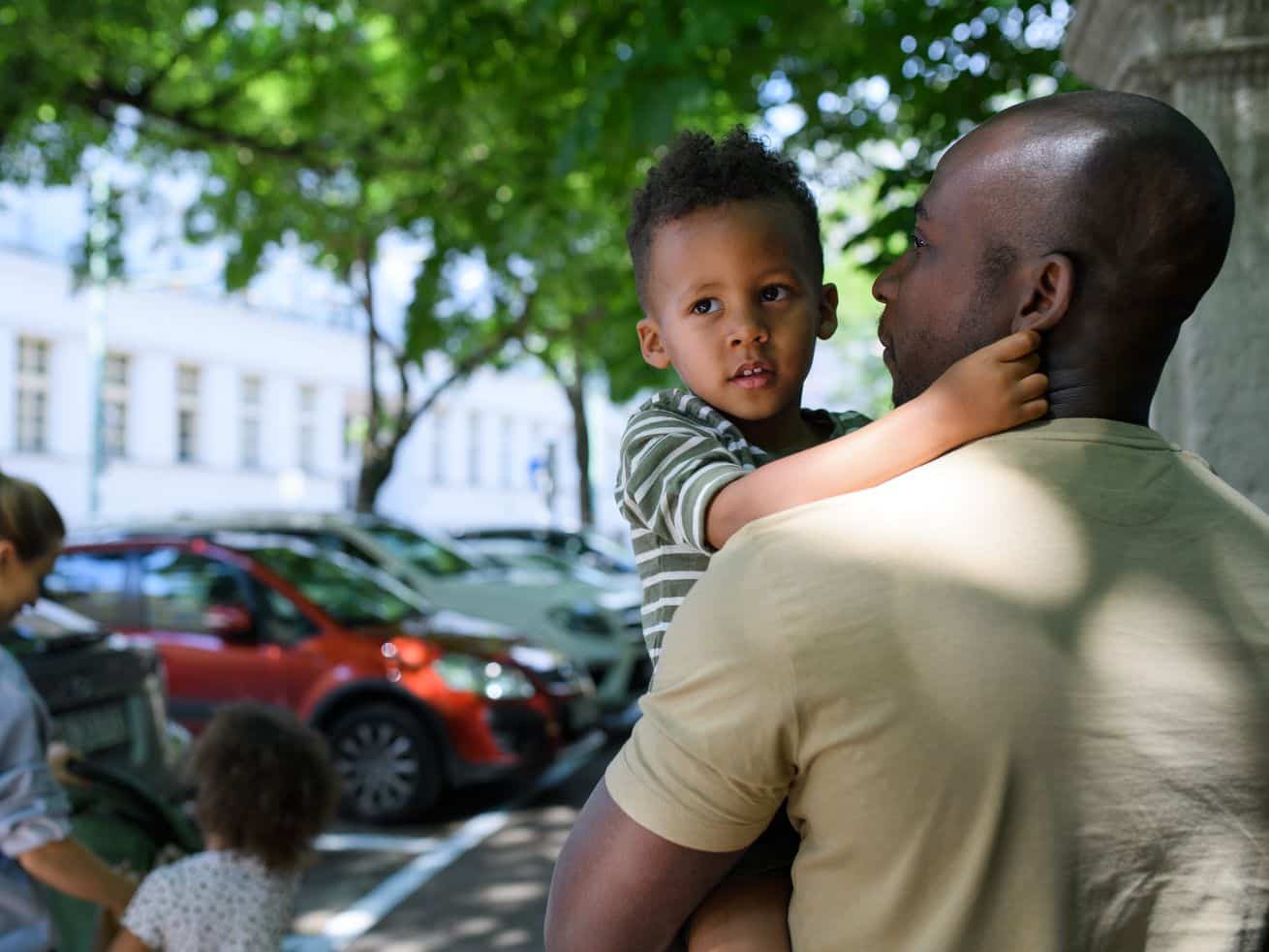“My shoulders already feel lighter.”
On July 15, millions of working-class parents across America woke up to a welcome surprise: hundreds of dollars directly deposited into their bank accounts with the label “CHILDCTC.” The first payment of the anticipated expanded child tax credit, passed as part of Biden’s $1.9 trillion Covid-19 relief package, had arrived for eligible families with children under 18.
Parents were granted the option to receive half of the annual tax credit in six monthly payments of up to $300 for each child under 6 years old, and $250 for children ages 6 to 17; the other half of the credit will be awarded in 2022. Eligibility is based on income and filing status — married filers, for example, must have an adjusted gross income of less than $150,000 a year in order to receive the full credit, which phases out gradually with higher incomes.
The money comes as Americans are still reeling from the devastating emotional and economic impact of the pandemic. But the financial impact of raising kids was a problem long before last year — in the US, almost one in five children lives in poverty. Parents, on average, spend a little over $750 per child per month on child care and about $722 on groceries for a family of three. And in 2021, rental prices have jumped 9.2 percent, bringing the national average monthly cost for one- and two-bedroom apartments upward of $1,700 and $1,900 respectively, according to real estate reports.
Low-income families have borne the brunt, especially as school closures have forced parents to forgo income to care for their children. For many of these families, the monthly benefit is a much-needed relief and a lifeline after a year of hardship. “Getting these payments now, I know that at least I have help covering food,” said David Watson, a technician and single parent of two. “Now I can pull back on overtime. I need sleep, man.”
Vox talked to three parents about how, after struggling financially in the pandemic, they believe these payments will enhance their lives. Our conversations have been edited and condensed for clarity.
“I can’t tell you how relieved I was”
David Watson, technician, father of two, New Jersey
My shoulders already feel lighter.
I am a single parent with two children — my son Suleemon, 11, and my daughter Haleemah, 17. Their mother has battled substance abuse and doesn’t provide for them financially. Money is always tight for us since rent and cost of living here is really high.
Before the pandemic, things were hard, but Covid made everything more uncertain and brought a lot of challenges. Between monitoring my kids’ online schooling and juggling my job, I felt like I was going to lose my mind. I can’t imagine how parents with younger kids do it.
/cdn.vox-cdn.com/uploads/chorus_asset/file/22729197/Photo_from_Niki_1.jpg) Courtesy of David Watson
Courtesy of David WatsonUsually, I would do overtime to make up for rent and any unexpected costs, but with Covid, it was impossible to keep up with the regular workweek, making overtime impossible. Then my job announced that staff would be furloughed through the summer. They told us to put in unemployment claims to help keep us paid. Around then, unemployment benefits also came with the extra $600. I was excited to finally catch a break — but it never happened. My unemployment claim was denied because someone tried to open a fraudulent claim, which locked my Social Security number. I called every number and visited every unemployment and Social Security office, but everything is still not running back to normal, so I can’t get help. We relied on pantries and I took a loan from my pension to get us through. The struggle was real!
Then my son broke both of his arms in a freak skating accident. At one point, I couldn’t work, to help him do everything. I’m proud to say, this June, my daughter graduated high school. But between graduation costs and college applications, more money was needed.
When I heard of the child tax credit, I was hopeful, but after the year I had, I didn’t want to get my hopes up too high. Then, on July 15, I was on my last $60 and wondering how to make it stretch for two weeks when I got a text message saying I got a deposit of $500 into my account. The child tax credit came through. I can’t tell you how relieved I was.
Part of me wishes it was more, but I don’t want to sound ungrateful, and … it’s something. People I know never received it or didn’t get the right amount. I know I can opt out and receive this money next year, but, for us, that is not an option. Getting these payments now, I know that at least I have help covering food. I can pull back on overtime. I need sleep, man.
“My goal right now is building generational wealth”
Shakisha Harvell, entrepreneur, mother of two, Virginia
The father of my two children — Shakisha, 9, and Shaquan, 12 — and I separated a few years ago, and since then he has not been a consistent provider. We moved to Virginia from New York City not too long before Covid hit to find more affordable housing and to get a better standard of living. In Virginia, we settled in well. The kids went to better schools and I started my own business. I opened my own store selling clothing, jewelry, and home goods. Things were looking up.
In the summer of 2020, we shut down due to Covid restrictions and my income all but dried up. When we reopened, it just wasn’t the same. My usual clients found it a hassle to shop, especially with the then 10-person maximum restriction that was in effect.
/cdn.vox-cdn.com/uploads/chorus_asset/file/22729204/Screen_Shot_2021_07_20_at_4.12.43_PM.png) Courtesy of Shakisha Harvell
Courtesy of Shakisha HarvellMaking it worse, my kids were now doing schooling online. If it wasn’t technical difficulties, it was battling teacher issues. When I tried working during school hours, I would get messages from teachers about the kids not attending or handing in assignments. My daughter and her teacher seemed to be always butting heads. And my son was getting withdrawn from a lack of social interaction. They seemed to be lagging further behind so I altered my work hours. Time I would usually spend on my business was now spent sitting through classes with my kids.
Eventually, I applied for unemployment and started receiving payments. We were now living on half of my usual income. My kids even got involved and started baking and selling cakes to help make up some money.
The extra $500 will help keep us stable — it’s not the generational wealth-building that politicians keep talking about, but it’s better than nothing. My goal right now is building generational wealth. Most of my family grew up in the projects, and I don’t want my kids stuck there. Black people in America never really get a chance to grow.
My kids have outgrown their clothes and need a new summer wardrobe, so I’m going to use some money for that. But at some point, I want to use part of it to encourage my children’s entrepreneurial spirit. I want them to learn, from a young age, everything about business. I’m thinking of a popcorn and icee machine to get them started. It can go well with their cake business.
“We will finally be able to afford some help again”
Melissa Petro, freelance writer, mother of two, New York
Before the pandemic started, I was scrambling to juggle motherhood and my work. I had two kids under 2 and it was hard. We couldn’t afford to hire anyone to watch them so I could work, but we needed the income. For a while, I would try to get assignments done during their naptime or after my husband got home from work. It was exhausting. Eventually, my son went to day care for six months. Then Covid began.
/cdn.vox-cdn.com/uploads/chorus_asset/file/22729210/Screen_Shot_2021_07_20_at_4.13.37_PM.png) Courtesy of Melissa Petro
Courtesy of Melissa PetroWhen day cares closed, working became impossible. Fortunately, I went on employment assistance, which was amazing. I finally didn’t have to kill myself with different jobs. I could just watch my kids and get paid for it. But we still couldn’t afford to get a nanny. We just hired young people to help watch them here and there. So that meant my career was really suffering.
With the extra money from the child tax credit, we will finally be able to afford some help again. Now, instead of hiring kids who don’t really need the work, we can pay an adequate wage and hire someone who is reliable. We are still unable to afford full-time care, which would cost about $4,000/month for two kids, but we are searching for a part-time nanny and I’m grateful to be able to afford any help at all. The money from the credit isn’t life-changing — because everything in New York is so expensive — but it puts a dent in the child care bill.
Author: Tiffanie Drayton
Read More



